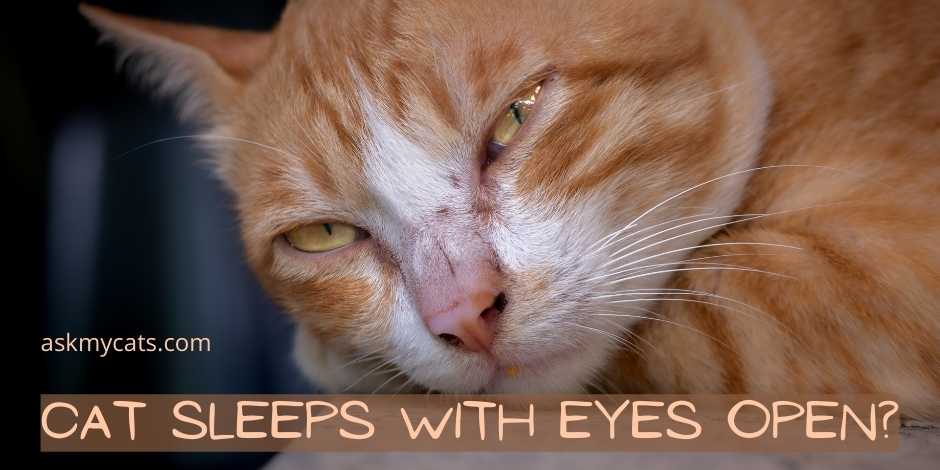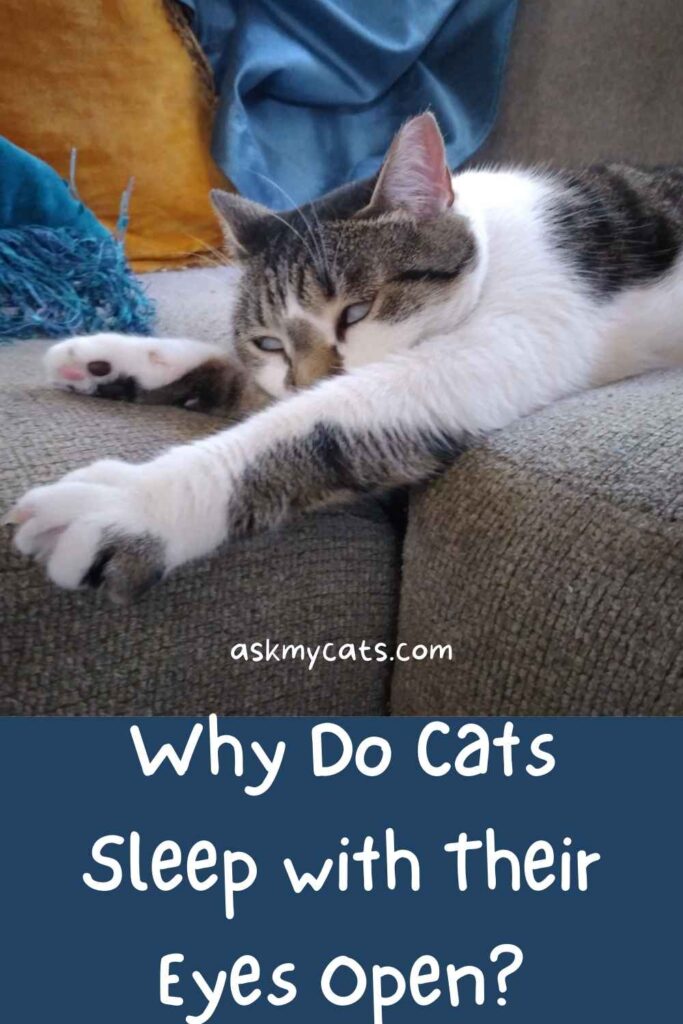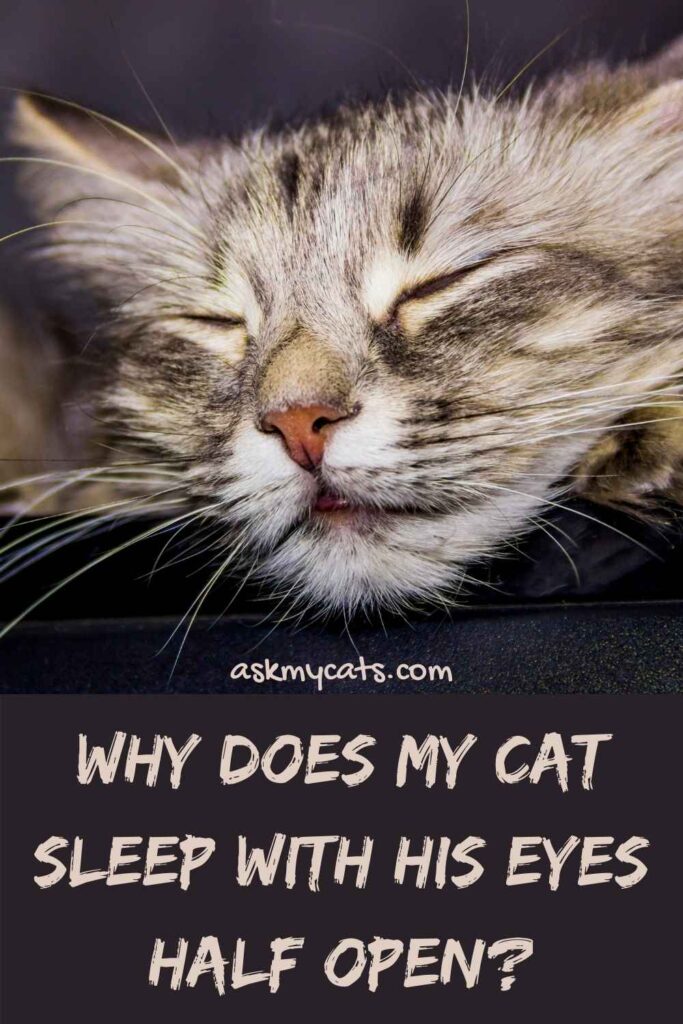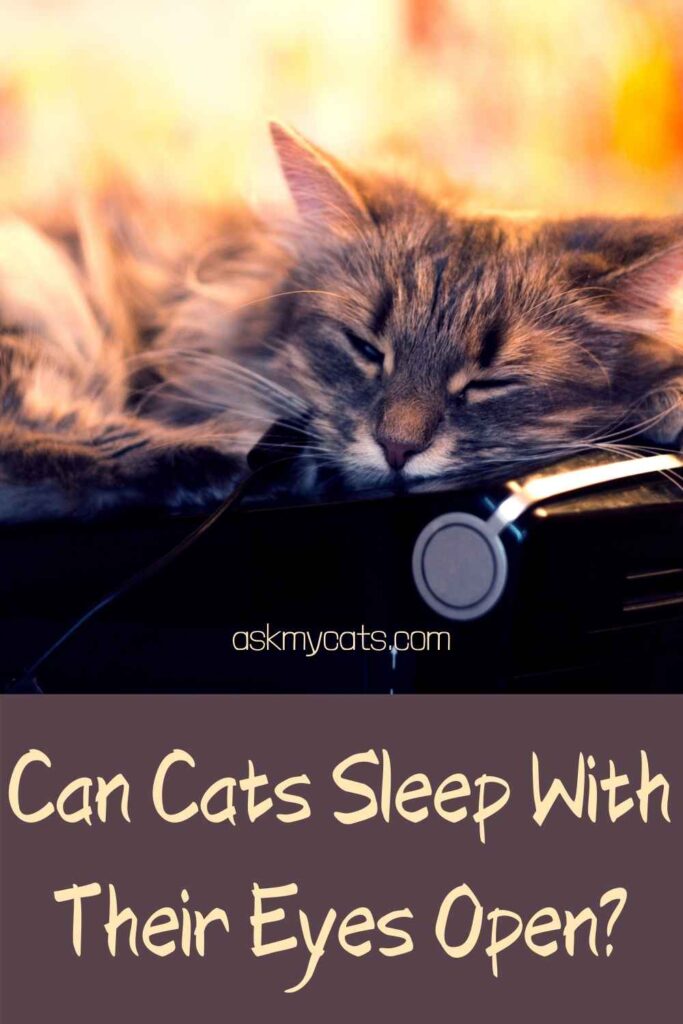Cats do a lot of unusual things, but one of the creepiest is sleeping with their eyes open.
This is not just scary, but some owners believe it is a warning that something is awry.
Cats are known for sleeping with one or both eyes open. When they do, the third eyelid is likely to appear (nictitating membrane). This prevents damage to the cornea.
When cats are in the lighter slow-wave sleep, they sleep with their eyes open (SWS).
They do this to defend themselves from harm by keeping a physical eye on what’s going on around them when sleeping, when they’re most vulnerable.
It might, however, be an indication of a painful injury that prevents cats from closing their eyes.
While it’s normal for cats to keep their eyes open, you should be on the lookout for symptoms of disease or injury.


Give Your Cat the Perfect Day
Get the Free Ebook!
Why Do Cats Sleep with Their Eyes Open?
Cats fall asleep with their eyes open for a variety of reasons. The most prevalent reason is that your cat is programmed to escape from danger.
This is a necessary aspect of a wild cat’s daily life, thus it must keep its eyes awake at all times. Predation is a possibility if the cat cannot run soon enough.
That is not, however, the sole reason.
Cats sleep with their eyes open because:

1. Light Sleep
Your cat is most likely resting with its eyes open since it is in a light nap. As previously stated, this enables cats to respond to danger.
If your cat sleeps with one or both eyes open, it is most likely not in the deepest stage of slumber. As a result, a light sound or touch might quickly wake it up.
Cats preserve energy by sleeping in tiny spurts throughout the day so they can hunt at night.
Cats are also affected by the weather, so when it’s chilly and rainy, they’re more prone to sleep lightly.
2. Noisy Environment
Domestic cats are less concerned about environmental risks, although they will keep their eyes open if the surroundings is loud and there is a lot going on.
Cats will tuck themselves away to sleep while keeping at least one eye open, especially if the house is full of people (even strangers) during the day.
This helps them to keep a close watch on any risks they may need to flee from.
Provide access to a quiet, dark room where your cat may tuck itself away to sleep if it looks uneasy in its surroundings.
Place your pet’s bedding and toys in the area to indicate that they are yours. This should make your cat feel at ease enough to go asleep in a deep quick eye moment.
3. Injured Eyes
Cats get into fights on a regular basis, especially if they venture out late at night.
They might easily wind up with a severe scratch across their eye or eyelid if they come across a territorial cat on their excursions. As a result, shutting them down may cause discomfort to the animal.
The third eyelid, in particular, can become lacerated if it is injured. This is a typical injury observed in active cats involved in fights, according to Greenside Animal Hospital.
Scratches can also lead to painful cornea ulceration.
The following are some of the most common signs and symptoms of ocular trauma:
- Inflammation and redness
- Eyes that have watery discharge
- A scrape that may be seen
- The presence of cloudiness
- Grabbing the eyeball
Eye medications can be used to treat these injuries, but in the most severe cases, suturing may be required.
4. Foreign Bodies
Foreign objects in the eye, such as glass, sand, or thorns, can create painful sores and ulcers, preventing the cat from resting with its eyes closed.
If the foreign body isn’t removed soon, it might cause an infection in the eye.
Items that barely penetrate the cornea’s surface can be removed using a local anesthetic. If the foreign body has penetrated deep into the body, it will need to be surgically removed.
5. Dry Eye
Keratoconjunctivitis sicca is the scientific name for dry eye in cats (KCS). When the cornea gets irritated and the surrounding tissue dries up, dry eye develops.
The failure to create enough tear duct film, which lubricates the eye and eliminates dirt and debris, causes it.
The following are some of the most prevalent causes of KCS, according to VCA Hospitals:
- Immune system weakness, which is frequently hereditary
- Herpes virus in cats
- A number of medicines are available.
- The consequences of an inner ear infection on the nervous system
- Cats with KCS are more likely to have:
- Eyes those are red and inflamed
- Squinting and blinking excessively
- Unattractive appearance
- Yellow, thick discharge
Some cats can’t close their eyes at all because they hurt too much, while others can’t close them at all because they hurt too much.
As a result, to minimize discomfort, they will sleep with the injured eye open.
6. Watching Out For Owners
Cats who have developed a strong attachment with their owners find it difficult to be apart from them and like to know where they are at all times.
Cats attach themselves to their owners and utilize them as a sense of security, according to a publication called Current Biology.
Researchers noticed that when their owners returned following a brief absence, cats that had built a deep link with them were less worried and calmer.
According to this study, some cats keep their eyes open when sleeping to keep a watch on their owners. If their owner leaves the room, the cat will wake up and follow them to stay nearby.
7. Waiting For Food
Hungry cats sleep little and often in order to save their energy.
If they are aware that food is around or that dinner is approaching, they will become more awake – even when sleeping – in order to prepare themselves for food.
Similarly, greedy or opportunistic cats keep their eyes wide so that they may respond as soon as their owner enters the kitchen or a storage room where food is kept.
They’ll follow in the hopes of winning goodies or food.
You might find it interesting to read about why is my cat closing one eye
Why Does My Cat Sleep With His Eyes Half Open?
When cats sleep with their eyes half open, their third eyelid is exposed. When a cat closes its eyes, the first two eyelids form on the top and bottom of the eye, meeting in the middle.

The third eyelid, commonly known as the nictitating membrane, is positioned at the inner corners of the eye.
When a cat blinks, the third eyelid operates like a windshield wiper, cleaning dust, pollen, debris, and other foreign substances. It also causes up to half of a cat’s regular tears to be produced.
Cats’ eyes occasionally remain open while they are calm and go into a deep slumber, as previously described.
Similarly, if the eyelids are closed at first, they will gradually open as the cat’s muscles relax.
During the cat’s resting periods, the third eyelid becomes more evident to protect the cornea and hydrate the eye.
When seeing a cat’s third eye while it’s resting is natural, seeing it when the cat is up and aware might be an indication of disease.
Among the signs and symptoms of an illness are:
- Urination or thirst problems Frequent trips to the litter box
- Appetite decreases or increases
- Increased articulation
- Weight gain or decrease
- Grooming practises have changed.
- Stale breath
- Hide and seek
As a result, keep an eye on your cat’s third eyelid to see if it’s still visible when he or she wakes up. If it does, consult a veterinarian.
While it may appear like cats sleep with their eyes wide open, their third eyelid protects them from dirt and debris.
Cats have a lot in common with their wild counterparts. As a result, even when they’re safe within their house, they have advanced instincts to protect themselves from threat.
Can Cats Sleep With Their Eyes Open?
YES. Cats are capable of sleeping with their eyes open. Many cats sleep with their eyes slightly open when they are sleeping.

The feature is more frequent in older cats, according to researchers. Despite the fact that this is natural behaviour, it’s still a good idea to keep an eye on your cat.
Sleeping with wide eyes, on the other hand, is rarely a reason for worry.
If you’re reading this, you’ve undoubtedly already seen your cat sleeping with her eyes open throughout the day.
Not all cats can do it, and those that can don’t always do it. It might be startling to find your cat sleeping with her eyes open for the first time.
It appears eerie, and you may begin to suspect that something is wrong with her.
Sleeping with their eyes open might suggest a medical problem in certain rare circumstances. Schedule an appointment with your veterinarian if you find your cat sleeping with her eyes open and twitching.
You might have seen and wondered why cats twitch when sleeping and dreaming.
If you’ve observed anything like this, keep in mind that it might be a symptom that your cat has epilepsy. In these situations, it’s always best to be safe and see your veterinarian.
While this isn’t exceptional, you might be curious as to why cats can sleep with their eyes open. The reasoning may astound you and make you even more enamoured with your cat.
Cats, like humans, have a sleep cycle with various phases. Their eyes are more likely to open while they are in a light slumber.
Even when they are sleeping, their bodies are nonetheless aware of their environment and react to what is going on.
You may also observe their ears twitching and turning toward whatever has piqued their interest. While your house is a secure haven for your cat, his instincts never rest.
Your cat can maintain track of her surroundings and feel more at peace if she sleeps with her eyes open. Most cats will not sleep with their eyes open during the deeper REM (rapid eye movement) sleep cycle (though it is still possible).
Because of an injury, a cat may also sleep with its eyes open. Underneath the other two eyelids, cats have a transparent third eyelid.
Your cat may be unable to shut her eye if this eyelid is injured. When your cat is awake, an eyelid injury is simple to see. If the cat’s eyelid is injured, surgery may be required.
Fortunately, eyelid injury is uncommon, and it’s unlikely that your cat is sleeping with her eyes open.
If your cat is exhibiting any additional symptoms, take her to the doctor for a thorough examination.
Cat Sleeps With Eyes Open: Should You Be Concerned?
No, there’s no need to be concerned because your cat is sleeping with her eyes open in the vast majority of situations.
If she exhibits additional signs such as twitching, seizures, or ocular injuries, you should make an appointment with your veterinarian. They’ll be able to tell you whether your cat has a medical condition.
A cat sleeping with wide eyes is, for the most part, quite natural — though eerie. Your pet is in perfect health.
Cats perform a lot of strange, humorous, and baffling things that we don’t understand. It might be unsettling to see your cat sleeping with its eyes open.
But keep in mind: Cats want to be aware of their environment at all times, thus they may snooze with their eyes open.
As far as cats go, they’re very typical; nothing to get worked up about.
Frequently Asked Questions
Why is my old cat sleeping with eyes open?
Nocturnal lagophthalmos is usually caused by a problem with the face’s muscles or nerves. Sleeping with the eyes open can be caused by anything that causes weakening or paralysis in the orbicularis oculi muscle (the muscle that shuts the eyelids).
Why are cats eyes open when they die?
Because muscle control is required to keep a cat’s eyes closed, they prefer to stay open after death. After examining the subjects: After a cat dies, the pupils often seem bigger than usual.
Do cats only sleep when they feel safe?
Cats may sleep for up to 16 hours every day. Because they are at their most vulnerable while resting, your cat’s resting quarters must be safe and secure.
Final Words
Cats can and do occasionally sleep with their eyes open. It will happen more frequently in certain cats than in others.
Sleeping with their eyes open can occur for a variety of reasons, but it seldom indicates that something is amiss. It’s also something to look out for in elderly cats.
Just keep an eye on your cat for any unusual behaviour or vocalisations of discomfort. If you sense something isn’t quite right, contact a veterinarian as soon as possible. It’s not worth taking the chance.
Drop your questions in the comments section below!
